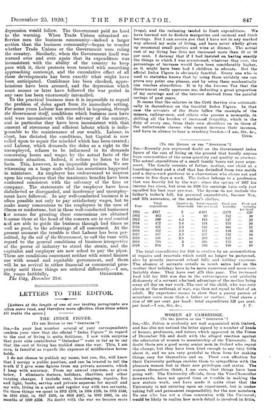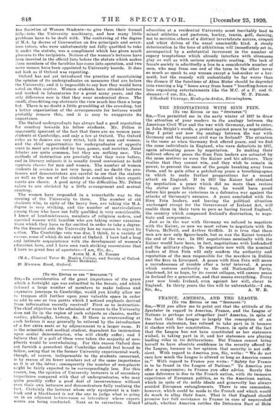WOMEN AT CAMBRIDGE.
LTo THE EDITOR or THE " SPECTATOR ") Sta,—Mr. Felton is evidently not well acquainted with Oxford, and has also not noticed the letter signed by a number of heads of houses, professors, and tutors which appeared in the Times of December 7th and dealt with the alleged reaction against the admission of women to membership of the University. No doubt there are a good many senior men in Oxford who regret the change, but they have been kind enough to say very little about it, and we are very grateful to them here for making things easy for themselves and us. Their own affection for their University perhaps enables them to sympathise with the pleasure women feel in their new privileges and statue. The women themselves think, I am sure, that things have been going well. The University officials, from the Vice-Chancellor downwards, have not spared time or t7ouble in making the new statute work, and have made it quite clear that the University is not entering upon an experiment, but is under* taking full and permanent responsibility for the new member% No one who has not a close connexion with the Universii/ would be likely to realize how much detail is involved in fittim
five Societies of Women Students—to give them their formal title—into the University machinery, and how many little problems have to be dealt with. The conferring of the degree of M.A. by decree of Convocation on five principals and seven- teen tutors, who were unfortunately not fully qualified to take it under the statute, was a compliment which has given much pleasure to the recipients. Notices of the women's lectures have been inserted in the official lists before the statute which makes :hem members of the faculties has come into operation, and two more women have been appointed to University boards. It does not look as if Oxford was repenting.
Oxford has not yet introduced the practice of ascertaining the opinion of its undergraduates on measures that are before the University, and it is impossible to say how they would have soled on this matter. Women students have attended lectures and worked in laboratories for a great many years, and the only difference now is that they wear academical dress. The small, close-fitting cap obstructs the view much less than a large hat. There is no doubt a little grumbling at the crowding, but better organization of the arrangements for lectures would probably remove this, and it is easy to exaggerate its importance.
The Oxford undergraduate has always had a good reputation for courtesy towards his fellow students. Mr. Felton is ipparently ignorant of the fact that there are no women pass- itudents at Cambridge, and only a few at Oxford. The Oxford rules as to dances are very strict, both for men and women, and the chief opportunities for undergraduates of opposite sexes to meet are provided by teas, games, and societies. Joint debates are quite common, but they are nothing new. The methods of instruction are precisely what they were before, end in literary subjects it is usually found convenient to hold separate classes for men and women. The number of women students in science is not very large, and no doubt the pro- fessors and demonstrators are careful to see that the stature as well as the sex of the student is considered when experi- ments are shown. A good many of the difficulties Mr. Felton refers to are obviated by a little arrangement and mutual courtesy.
The women have responded in a remarkable way to the
opening of the University to them. The number of old students who, in spite of the heavy fees, are taking the M.A. degree is very striking, and the number of matriculations among those who have not fully qualified is very considerable. I know of head-mistresses, members of religious orders, and married women with families who are taking minor examina- tions which they have so far omitted in order to take a degree. On the financial side the University has no reason to regret its action. The Cambridge vote was due, I think, to a variety of rouses, some of which do not exist at Oxford. I have had a long and intimate acquaintance with the development of women's e ducation here, and I have seen such striking conversions that I have no great fear of apostates.—I am, Sir, &c., ANKIE M. A. H. Rooms
(M.A., Classical Tutor St. Ruabn College, and Society of Oxford Rom. Students).
39 Museum flood, Oxford.



































 Previous page
Previous page